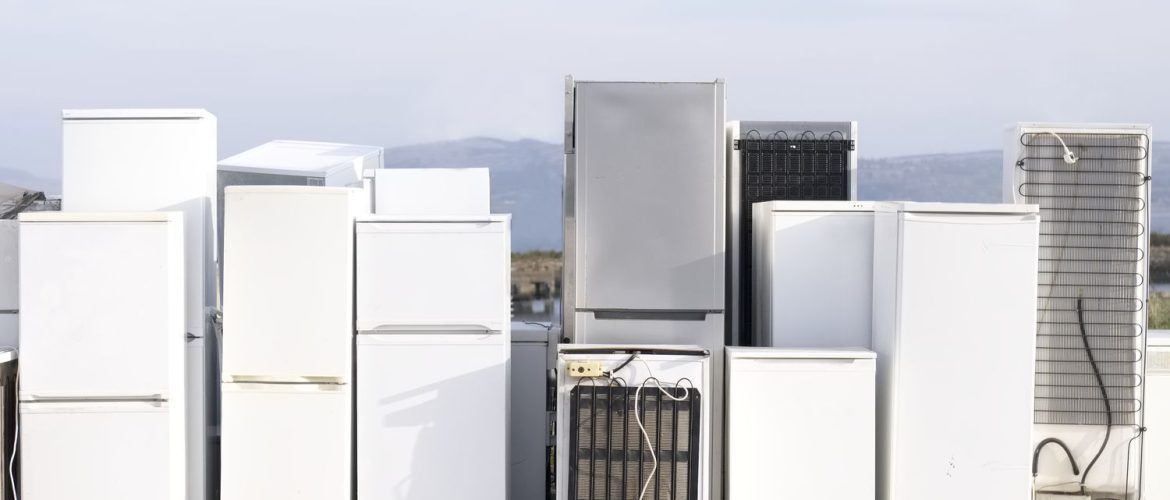Disposing of old fridges incorrectly can pose significant threats to the environment and contravene legal requirements. Recycling4You offers businesses a streamlined, eco-friendly solution for commercial refrigeration removal.
This guide explores the environmental hazards associated with fridges, outlines legal obligations under WEEE and Hazardous Waste regulations, and explains how Recycling4You’s professional service ensures full compliance and sustainable disposal. Readers will discover the various disposal options available, step-by-step processes for collection and recycling, and practical tips to prepare appliances for removal.
By choosing Recycling4You, businesses benefit from transparent pricing, thorough duty-of-care documentation, and responsible recovery of refrigerants and materials for reuse.
Key Takeaways
- Improper fridge disposal poses serious environmental and legal risks, including ozone depletion and potential fines.
- Businesses are legally obliged to comply with WEEE and Hazardous Waste regulations when discarding refrigeration units.
- Recycling4You provides a fully licenced, eco-friendly disposal service tailored for commercial premises.
- The process includes secure collection, safe degassing, material recovery, and audit-ready documentation.
- Preparing appliances properly before collection helps ensure efficient removal and avoids delays.
Fridges contain CFCs and HCFCs—greenhouse gases that harm the ozone layer if not properly reclaimed. Disposal matters. ♻️
Why Responsible Fridge Disposal Matters
Old fridges contain chlorofluorocarbons (CFCs) and hydrochlorofluorocarbons (HCFCs) that, if released, can deplete the ozone layer and contribute to greenhouse-gas emissions. Discarding appliances in landfill sites also consumes valuable space and risks soil contamination from insulating foam.
Under the Environmental Protection Act and WEEE Regulations, businesses have a statutory duty of care to ensure safe disposal of electrical equipment. Failure to comply may result in substantial fines, legal action, and reputational damage.
Fly-tipping of fridges is an offence that attracts penalties and clean-up costs. By engaging a licenced waste carrier such as Recycling4You, companies safeguard the environment, adhere to legal requirements, maintain good corporate citizenship and recover metals and plastics for manufacturing new products.
Key Legal and Environmental Considerations
- WEEE Regulations: Treat fridges as hazardous electrical waste and register with a compliance scheme.
- Hazardous Waste Consignment Notes: Record each consignment’s fridge type, weight and origin.
- Carrier Licensing: Waste carriers must hold a valid Environmental Permit and WEE ELV authorisation; Recycling4You fulfils both.
- COSHH Guidelines: Govern handling of refrigerants, insulating foam and heavy metals at every stage.
- Enforcement Risks: Non-compliance can lead to prohibition orders, enforcement notices and fines up to £50,000 per offence.
- Environmental Controls: Proper degassing prevents the release of ozone-depleting substances; shredding maximises material recovery.
Recycling4You’s processes ensure each appliance is treated at an approved facility under strict environmental and health-and-safety controls.
Your Disposal Options Explained
Businesses and domestic customers have several routes for disposing of unwanted fridges. Each option varies by cost, convenience, audit trail and environmental credentials.
| Option | Suitable For | Cost | Advantages | Disadvantages |
| Local Council Bulky Waste | Domestic premises only | Low–moderate | Subsidised rates; simple booking process | No duty-of-care certificate; long waiting times |
| Manufacturer/Retailer Take-Back | Appliance replacement orders | Varies (often free) | Trade-in incentives; direct return to supplier | Limited to certain brands; strict time limits |
| Professional Service (Recycling4You) | Businesses and trades | Competitive (quote) | Full compliance; audit trail; eco-friendly | Cannot collect directly from private homes |
Recycling4You specialises in business-address collections. While domestic fridge disposal is facilitated via trade customers, the company does not collect directly from private homes. Every collection adheres to WEEE and Hazardous Waste regulations, with full consignment-note support and optional certificates of destruction.
Step-by-Step: The Eco-Friendly Fridge Removal Process
Step 1: Request a Quote
Request a quote online or call 01507 526720. Provide details:
- Appliance type and model
- Quantity of units
- Collection address (business premises only)
Step 2: Pre-Collection Preparation
Ensure each fridge is:
- Emptied of contents and fully defrosted at least 24 hours prior
- Disconnected from power and water supplies
- Doors secured or removed where possible
- Accessible for tail-lift Luton van or articulated lorry
Step 3: On-Site Collection
A licenced WEEE waste carrier arrives:
- Registers consignment on a Hazardous Waste Consignment Note
- Logs appliance weights and serial numbers
- Uses satellite-tracked vehicles for full transparency
Step 4: Licensed Recycling Facility Delivery
Appliances are transported to an approved plant where:
- Refrigerants are safely degassed and reclaimed
- Units are shredded, separating metals, plastics and foam
- CFCs and HCFCs are destroyed or recycled in line with permits
Step 5: Proof of Disposal
Recycling4You issues:
- A copy of the completed consignment note
- Certificate of destruction or recycling upon request
- A detailed report suitable for audit purposes
What to Expect from a Professional Service Provider
Choosing Recycling4You guarantees:
- Reliable Scheduling: Collection dates confirmed in advance, with optional timeslot upgrades
- Transparent Pricing: All fees outlined upfront, covering collection, paperwork and plant charges
- Full Compliance: Adherence to WEEE, Hazardous Waste and COSHH regulations by licenced carriers
- Audit-Ready Documentation: Hazardous Waste Consignment Notes, certificates of destruction and delivery confirmations
- Environmentally Responsible Recycling: Maximum recovery of CFCs, metals, plastics and foam in approved facilities
- Dedicated Support: Expert guidance on disposal best practices and duty-of-care obligations
Recycling4You’s professional approach delivers peace of mind and environmental integrity at every stage.
Preparing Your Fridge for Removal: Practical Tips
Businesses should follow these guidelines to streamline collection and avoid delays:
- Defrost and dry the fridge 24 hours before collection to prevent leaks
- Remove all food, shelving and loose items; secure doors with tape or straps
- Label units clearly if multiple appliances are being collected
- Maintain clear access routes: wide doorways, unobstructed corridors and reserved parking
- Inform Recycling4You of any special requirements, such as integrated freezer compartments or unusual dimensions
- Notify staff of scheduled collection times to ensure someone is present
Conclusion: Eco-friendly fridge disposal
Ensure responsible fridge disposal with Recycling4You’s compliant and eco-friendly service. Get your free, simple, no-obligation online quote today at Recycling4You.co.uk now.
Get your free, no-obligation quote for compliant and eco-friendly fridge disposal today or contact us if you have any questions.
Further Reading
- The Environmental Impact of Refrigerator Disposal: What You Need to Know: This article explores the environmental hazards of improper refrigerator disposal, including the release of toxic substances and the importance of sustainable practices.
- Regulations: Waste Electrical and Electronic Equipment (WEEE): An official UK government guide detailing the WEEE regulations, outlining the responsibilities of businesses in managing electrical and electronic waste.

